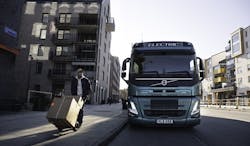Shipping firm DFDS orders 25 electric Volvo Trucks to run routes in Europe
DFDS, Northern Europe's largest shipping and logistics company, has placed an additional order of 25 heavy electric trucks with Volvo Trucks. With the new order, DFDS’ total order is for 125 electric trucks.
Delivery is expected to start in the fourth quarter of 2022. DFDS will use the new trucks for transport in Europe.
The Volvo FM Electric truck can drive up to 500km on a work day and recharge quickly. It can be charged overnight and through high power fast charging on route.
“Green investments in the heavy transport industry are a prerequisite to reach the emissions reductions needed for DFDS, customers, and society. Our partnership with Volvo Trucks allows DFDS to invest further in green transport solutions, already in high demand among customers. We hope such investments increase the demand for green infrastructure solutions across Europe,” says Niklas Andersson, Executive Vice President and Head of Logistics Division at DFDS.
Volvo Trucks started serial production of electric trucks in 2019
About the Author
EnergyTech Staff
Rod Walton is senior editor for EnergyTech.com. He has spent 17 years covering the energy industry as a newspaper and trade journalist.
Walton formerly was energy writer and business editor at the Tulsa World. Later, he spent six years covering the electricity power sector for Pennwell and Clarion Events. He joined Endeavor and EnergyTech in November 2021.
He can be reached at [email protected].
EnergyTech is focused on the mission critical and large-scale energy users and their sustainability and resiliency goals. These include the commercial and industrial sectors, as well as the military, universities, data centers and microgrids.
Many large-scale energy users such as Fortune 500 companies, and mission-critical users such as military bases, universities, healthcare facilities, public safety and data centers, shifting their energy priorities to reach net-zero carbon goals within the coming decades. These include plans for renewable energy power purchase agreements, but also on-site resiliency projects such as microgrids, combined heat and power, rooftop solar, energy storage, digitalization and building efficiency upgrades.
